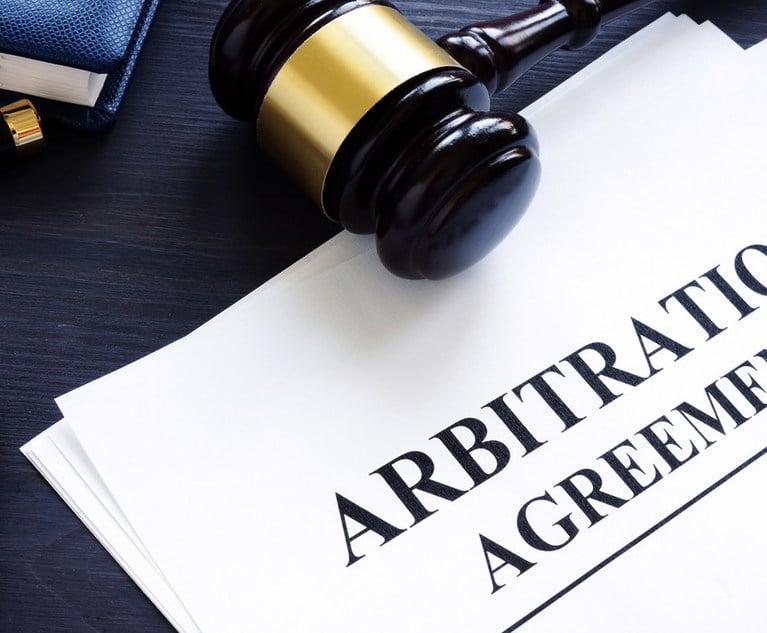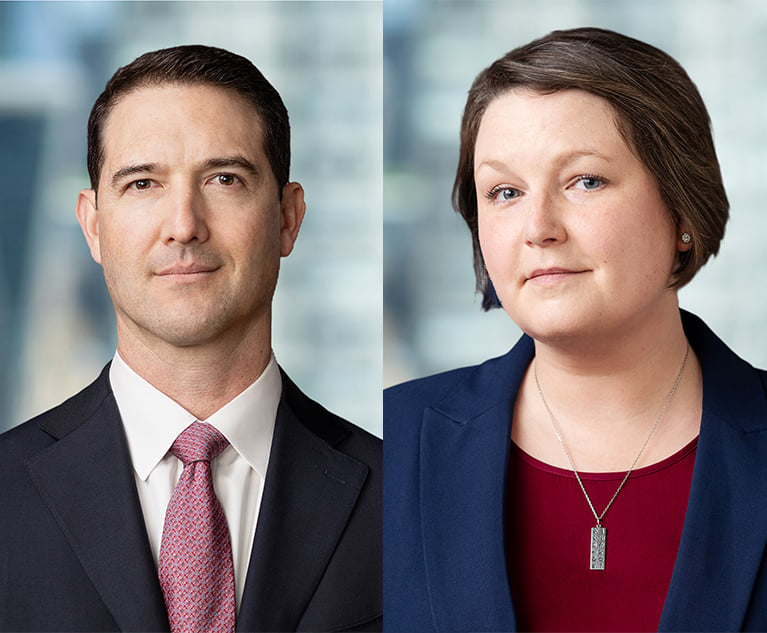Beginning of the End: SASH Act Targets Predispute Arbitration Agreements The Beginning of the End: Ending Forced Arbitration of Sexual Assault and Sexual Harassment Act of 2021
The Ending Forced Arbitration of Sexual Assault and Sexual Harassment Act (SASH Act) amends the Federal Arbitration Act to prohibit employers from enforcing predispute arbitration agreements or joint-action waivers relating to sexual assault or sexual harassment disputes brought under federal, tribal or state law.
April 27, 2022 at 12:00 PM
7 minute read
 Since the #MeToo movement began in 2017, legislators have enacted various legal reforms aimed at reducing and eliminating sexual assault and sexual harassment in the workplace. Many of the changes have been on the state level, including in New York. Recently, on Feb. 10, 2022, Congress passed the Ending Forced Arbitration of Sexual Assault and Sexual Harassment Act (the SASH Act). Despite the partisan split in Congress, the SASH Act received overwhelming bipartisan support. Soon after, on March 3, 2022, President Biden signed the SASH Act into law. The SASH Act amends the Federal Arbitration Act (FAA) to prohibit employers from enforcing predispute arbitration agreements or joint-action waivers relating to sexual assault or sexual harassment disputes brought under federal, tribal or state law.
Since the #MeToo movement began in 2017, legislators have enacted various legal reforms aimed at reducing and eliminating sexual assault and sexual harassment in the workplace. Many of the changes have been on the state level, including in New York. Recently, on Feb. 10, 2022, Congress passed the Ending Forced Arbitration of Sexual Assault and Sexual Harassment Act (the SASH Act). Despite the partisan split in Congress, the SASH Act received overwhelming bipartisan support. Soon after, on March 3, 2022, President Biden signed the SASH Act into law. The SASH Act amends the Federal Arbitration Act (FAA) to prohibit employers from enforcing predispute arbitration agreements or joint-action waivers relating to sexual assault or sexual harassment disputes brought under federal, tribal or state law.
Key Terms and Purpose of the SASH Act
The SASH Act defines a predispute arbitration agreement as "any agreement to arbitrate a dispute that had not yet arisen at the time of the making of the agreement." A predispute joint-action waiver is defined as "an agreement [] that would prohibit, or waive the right of, one of the parties to the agreement to participate in a joint, class, or collective action [] concerning a dispute that has not yet arisen at the time of the making of the agreement." The SASH Act invalidates both predispute arbitration agreements and predispute joint action waivers "with respect to a case which is filed under federal, tribal, or state law and relates to the sexual assault dispute or the sexual harassment dispute" unless "the person [or] named representative of a class or in a collective action" elects otherwise.
In other words, claimants now have the choice to bring sexual assault or sexual harassment claims in court or proceed to arbitration—notwithstanding any agreement they may have signed requiring such claims to be resolved through arbitration. Claimants may also choose to bring suit individually or as a class, even if they signed an agreement waiving their right to collective legal action. As President Biden stated prior to signing the SASH Act, "there will be cases where victims want their claims resolved in private. But some survivors will want their day in court. And that should be their choice and nobody else's choice."
This content has been archived. It is available through our partners, LexisNexis® and Bloomberg Law.
To view this content, please continue to their sites.
Not a Lexis Subscriber?
Subscribe Now
Not a Bloomberg Law Subscriber?
Subscribe Now
NOT FOR REPRINT
© 2025 ALM Global, LLC, All Rights Reserved. Request academic re-use from www.copyright.com. All other uses, submit a request to [email protected]. For more information visit Asset & Logo Licensing.
You Might Like
View All


Piercing the Corporate Veil; City’s Authority To Order Restorations; Standing: This Week in Scott Mollen’s Realty Law Digest
Law Firms Mentioned
Trending Stories
Who Got The Work
J. Brugh Lower of Gibbons has entered an appearance for industrial equipment supplier Devco Corporation in a pending trademark infringement lawsuit. The suit, accusing the defendant of selling knock-off Graco products, was filed Dec. 18 in New Jersey District Court by Rivkin Radler on behalf of Graco Inc. and Graco Minnesota. The case, assigned to U.S. District Judge Zahid N. Quraishi, is 3:24-cv-11294, Graco Inc. et al v. Devco Corporation.
Who Got The Work
Rebecca Maller-Stein and Kent A. Yalowitz of Arnold & Porter Kaye Scholer have entered their appearances for Hanaco Venture Capital and its executives, Lior Prosor and David Frankel, in a pending securities lawsuit. The action, filed on Dec. 24 in New York Southern District Court by Zell, Aron & Co. on behalf of Goldeneye Advisors, accuses the defendants of negligently and fraudulently managing the plaintiff's $1 million investment. The case, assigned to U.S. District Judge Vernon S. Broderick, is 1:24-cv-09918, Goldeneye Advisors, LLC v. Hanaco Venture Capital, Ltd. et al.
Who Got The Work
Attorneys from A&O Shearman has stepped in as defense counsel for Toronto-Dominion Bank and other defendants in a pending securities class action. The suit, filed Dec. 11 in New York Southern District Court by Bleichmar Fonti & Auld, accuses the defendants of concealing the bank's 'pervasive' deficiencies in regards to its compliance with the Bank Secrecy Act and the quality of its anti-money laundering controls. The case, assigned to U.S. District Judge Arun Subramanian, is 1:24-cv-09445, Gonzalez v. The Toronto-Dominion Bank et al.
Who Got The Work
Crown Castle International, a Pennsylvania company providing shared communications infrastructure, has turned to Luke D. Wolf of Gordon Rees Scully Mansukhani to fend off a pending breach-of-contract lawsuit. The court action, filed Nov. 25 in Michigan Eastern District Court by Hooper Hathaway PC on behalf of The Town Residences LLC, accuses Crown Castle of failing to transfer approximately $30,000 in utility payments from T-Mobile in breach of a roof-top lease and assignment agreement. The case, assigned to U.S. District Judge Susan K. Declercq, is 2:24-cv-13131, The Town Residences LLC v. T-Mobile US, Inc. et al.
Who Got The Work
Wilfred P. Coronato and Daniel M. Schwartz of McCarter & English have stepped in as defense counsel to Electrolux Home Products Inc. in a pending product liability lawsuit. The court action, filed Nov. 26 in New York Eastern District Court by Poulos Lopiccolo PC and Nagel Rice LLP on behalf of David Stern, alleges that the defendant's refrigerators’ drawers and shelving repeatedly break and fall apart within months after purchase. The case, assigned to U.S. District Judge Joan M. Azrack, is 2:24-cv-08204, Stern v. Electrolux Home Products, Inc.
Featured Firms
Law Offices of Gary Martin Hays & Associates, P.C.
(470) 294-1674
Law Offices of Mark E. Salomone
(857) 444-6468
Smith & Hassler
(713) 739-1250







